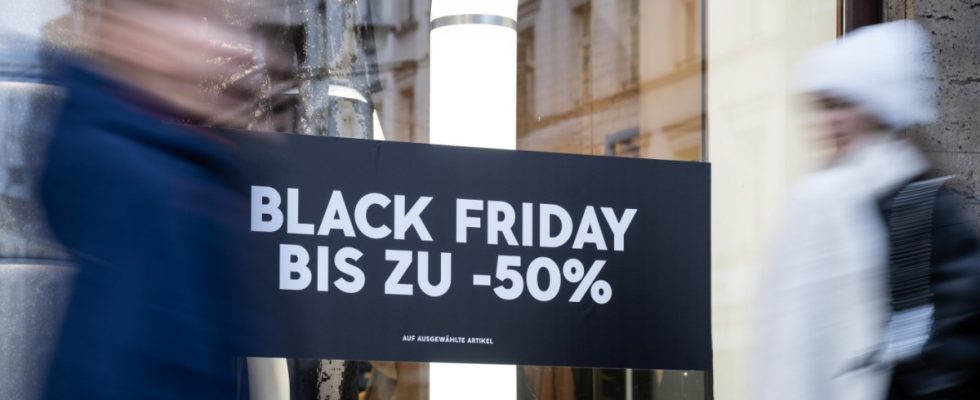This time things are different on Black Friday, Cyber Monday and Black Week as a whole. According to forecasts, the discount days will not trigger a surge in retail sales this time. In any case, the German Trade Association (HDE) only works of an increase in sales of three percent on the two main days. In previous years, the increase rates were often around 20 percent. “The main reason for this is the poor consumer mood. People are much more reluctant to take advantage of special offers,” says HDE deputy managing director Stephan Tromp.
Black Week has nevertheless firmly established itself as a marketing event, not only in German retail – online and stationary. Almost everyone who wants to sell something, be it bank loans, electric cars or package holidays, is now taking part. In addition, the supposed special offers are no longer only available on Black Friday or Cyber Monday and no longer only on the weekend in between. But this year it’s perhaps more blatant than ever on the days before and probably after. Not to forget that Chinese e-commerce giant Alibaba recently promoted its Singles Day and Amazon held its Prime Day.
The loud drumbeat for the alleged discounts is related to the inflation-related reluctance to buy in Germany. Many companies have huge overcapacity and warehouses are jam-packed. Because German citizens have been saving for a long time, just like many other Europeans. And even in China, where many goods are manufactured, there is a slump in consumption. The pressure to get rid of the products is particularly great this year.
The discounts put pressure on margins and damage Christmas business
In addition, an average increase in sales of three percent can mean a real loss of business for retailers, especially for chain stores in the city center. For many, costs have increased, for example for energy, transport or rent. However, customers expect them to take part in the discount campaign. Some retailers only do this “with their fist in their pocket,” says Bernd Ohlmann, managing director of the Bavarian Trade Association. Because the discounts put pressure on margins and also damaged the Christmas business, which was just beginning.
This is also new to this extent: according to the Boston Consulting Group (BCG). 62 percent of those surveyed use Black Week for Christmas shopping. However, what they buy now, they won’t buy again in December. In general, they shop much more specifically than before. Many people find out about price developments beforehand and compare prices from different providers. They shop less spontaneously and impulsively. In fact, many people make larger purchases that are already planned on discount days, according to a study by the Cologne Institute for Retail Research (IFH).
Many customers’ price expectations are becoming increasingly unrealistic
The days around Black Friday have therefore become a double-edged sword for retailers. This year this is more evident than ever before. Christopher Henke, sales manager at the payment service provider Mollie, sees a drop in prices: “Thanks to huge discounts, retailers basically shoot themselves up with prices on Black Friday,” he says. Many customers only bought certain products on that day, which had a negative impact on sales and profit margins for the year as a whole.
In addition, many customers’ price expectations are becoming increasingly unrealistic. According to BCG, the Germans would like a price reduction of at least 30 percent. But on last year’s Black Friday, the actual average savings were across all product groups at just six percent, as the price comparison portal Idealo calculated. Black Friday is therefore only a limited bargain day for customers and an ambivalent day for many retailers.
What is not new is that, according to IFH, Amazon will once again emerge as the winner of the discount battle. Fraudsters are out and about again this year and there is great criticism of the discount days from environmental and consumer advocates. What is new, however, is that artificial intelligence will accompany the sales process to a greater extent this time. And that young people in particular are now massively against the consumer craze.
According to Idealo, 52 percent of Generation Z, those born between 1995 and 2009, consider Black Friday to be outdated in times of climate crisis and excessive consumption. Not all of them are therefore supporters of the consumer-critical “Buy Nothing Day”. But second-hand gifts are completely okay for her. And not just for her. In a representative survey by Idealo, 57 percent of those surveyed said they were also happy about used items. Suppliers of refurbished products are also heavily advertising Black Friday.

